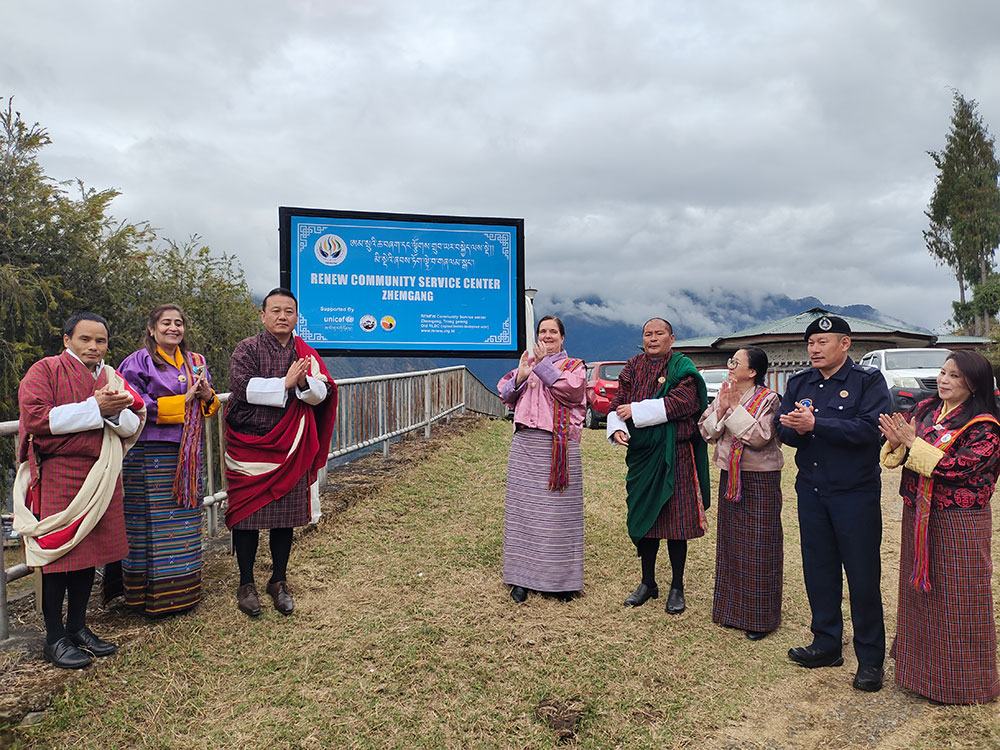Lhakpa Quendren
In the ongoing battle against the rising tide of gender-based violence (GBV), RENEW (Respect, Educate, Nurture, and Empower Women) has taken a significant step forward with the establishment of a community service centre in Zhemgang dzongkhag.
Zhemgang is among the ten dzongkhags selected to host a community service centre, a decision based on reported cases of gender-based violence (GBV).
With 24 cases recorded in the previous year alone, Zhemgang highlights the pressing need to address GBV issues within the community. A feasibility study conducted by RENEW further underscores the prevalence of GBV cases, emphasizing the urgency of implementing measures to combat this pervasive issue.
The initial pilot of these centres in Paro, Bumthang, and Tsirang yielded promising results, successfully managing to address 243 cases within the first six months of 2023. Building on this success, similar facilities have been established in Dagana, Gelephu, Samtse, Phuentsholing, Punakha, and Tashigang, further expanding access to vital support services for individuals affected by gender-based violence across the nation.
The community service centre, serving as a sanctuary for GBV victims, is thoughtfully equipped with essential amenities such as bedding, kitchen supplies, and other basic facilities. These provisions ensure that individuals seeking refuge find comfort and support in a nurturing environment as they navigate through challenging times.
Established in May 2023 with the support of UNICEF, the centre has already played a crucial role in providing assistance to those in need. Within this year alone, the centre has witnessed three cases of emotional abuse, underscoring the ongoing need for such facilities to address various forms of gender-based violence and provide essential support to survivors.
Zhemgang Dzongda Kesang Jigme said the centre will help expand the services of the Multi-Sectoral Task Force on Child Protection and Social Services (MSTF-CBSS) at all levels to achieve the mandate of RENEW. “We should be able to work very closely with the local government leaders and other stakeholders.”
Collaboration with local government leaders and other stakeholders, he said, is important to ensure comprehensive support and assistance to those affected by gender-based violence.
Further to that, he said, the centre was established with the primary aim of providing support to victims of domestic and gender-based violence, as well as extending assistance to underprivileged and vulnerable individuals within the dzongkhag.
Noala Skinner, UNICEF’s Deputy Regional Director for South Asia, said that the centre serves a dual purpose: not only does it provide a safe haven for women and children, but it also plays a crucial role in promoting, protecting, and fulfilling their rights.
By offering essential support and resources, the centre empowers individuals to assert their rights and live free from the threat of violence, contributing to the broader goal of creating a more equitable and just society for all.
“Working with men and boys in the community is a critical part of ending violence against women and children,” she said, stressing the importance of engaging men as allies in the fight against gender-based violence.
Noala Skinner visited the centre on World Water Day, coinciding with the recent celebration held at Zhemgang Primary School as part of UNICEF’s commemoration of 50 years of progress for children in Bhutan.
The centre offers a wide range of services aimed at nurturing individuals and families towards a brighter future. These include counselling to address emotional and psychological needs, legal aid to navigate through legal processes and seek justice, vocational training to enhance skills and empower economic independence, and healthcare support to ensure physical well-being.
The centre’s case manager, Karma Yangzom, said the centre’s diverse range of services are tailored to meet the unique needs of the community. “As we look forward to the future, the centre remains steadfast in its commitment to serving the community.”
“The centre’s goals are ambitious, and the challenges are significant, but with continued support from donors and stakeholders, I am confident that we can create a brighter tomorrow for all,” she added.
As the centre is currently housed within the structure of the National Housing Development Corporation Limited, the dzongkhag anticipates exploring the possibility of securing a permanent space at a more suitable location in the coming years.
“Probably from the second year of the 13th Plan, if resources are forthcoming, we should begin planning for a permanent space,” Kesang Jigme said, expressing hope to address other associated challenges.
“We will have to strategise efficient and timely service delivery, especially to reach the far-flung villages, since the gewogs are scattered across the dzongkhag. Going forward, we will be able to find amicable solutions,” he added.
“We also have plans to implement advocacy and awareness programmes and other activities for local governments, private organizations, business communities, and religious institutions at the grassroots level to achieve the mandate of RENEW,” said Gopal Hingmang, Zhemgan’s public health officer.
In 2023, RENEW saw 778 cases, with the highest number involving emotional abuse at 377 cases, followed by 216 cases of GBV. Of these cases, 719 were females and 69 were males, with most victims being above 18 years old.
Phuentsholing reported the highest number of cases with 101, followed by Paro with 96 cases and Thimphu with 76 cases. Gasa and Haa reported four and seven cases, respectively.


